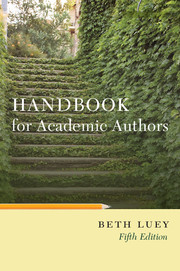Book contents
- Frontmatter
- Contents
- Illustrations
- Preface to the Fifth Edition
- Preface to the Fourth Edition
- Preface to the Third Edition
- Preface to the Second Edition
- Preface to the First Edition
- Chapter 1 The Publishing Partnership
- Chapter 2 Journal Articles
- Chapter 3 Revising a Dissertation
- Chapter 4 Finding a Publisher for the Scholarly Book
- Chapter 5 Working with Your Publisher
- Chapter 6 Multiauthor Books and Anthologies
- Chapter 7 Finding a Publisher for the College Textbook
- Chapter 8 Working with Your Textbook Publisher
- Chapter 9 Books for General Readers
- Chapter 10 The Mechanics of Authorship
- Chapter 11 Costs and Prices
- Chapter 12 Born Digital
- Bibliography
- Index
Chapter 7 - Finding a Publisher for the College Textbook
Published online by Cambridge University Press: 02 December 2010
- Frontmatter
- Contents
- Illustrations
- Preface to the Fifth Edition
- Preface to the Fourth Edition
- Preface to the Third Edition
- Preface to the Second Edition
- Preface to the First Edition
- Chapter 1 The Publishing Partnership
- Chapter 2 Journal Articles
- Chapter 3 Revising a Dissertation
- Chapter 4 Finding a Publisher for the Scholarly Book
- Chapter 5 Working with Your Publisher
- Chapter 6 Multiauthor Books and Anthologies
- Chapter 7 Finding a Publisher for the College Textbook
- Chapter 8 Working with Your Textbook Publisher
- Chapter 9 Books for General Readers
- Chapter 10 The Mechanics of Authorship
- Chapter 11 Costs and Prices
- Chapter 12 Born Digital
- Bibliography
- Index
Summary
The book originated in the suggestion of a publisher, as many more good books have done than the arrogance of the man of letters is commonly inclined to admit.
G. K. Chesterton, on The Pickwick PapersThe College Textbook
A textbook is designed specifically to help an instructor teach a subject and students learn it. Although scholarly monographs and collections of articles are sometimes used as supplementary or even main texts in a college course, their primary purpose is to disseminate new thought or research findings. Textbooks, by contrast, rarely represent the culmination of research or what is traditionally considered “scholarly” activity. Instead, they summarize, organize, and analyze the accumulated wisdom of an area of knowledge, presenting it in a way that is accessible to students at a specific level of competence.
The writers of the most successful textbooks in a field are not necessarily – or even usually – at the cutting edge of research. They are more often, though not always, extremely good teachers. The skills required to write a good textbook are those of organization, synthesis, explication, and communication. However, the ability to communicate orally in a lecture class or seminar does not automatically translate into the ability to write effectively. As you write a textbook, you do not get instant student responses of understanding or befuddlement. You cannot carry on a conversation or discussion. You must decide, on the basis of logic, instinct, and experience, what requires extensive explanation and what will be grasped quickly.
- Type
- Chapter
- Information
- Handbook for Academic Authors , pp. 123 - 132Publisher: Cambridge University PressPrint publication year: 2009



